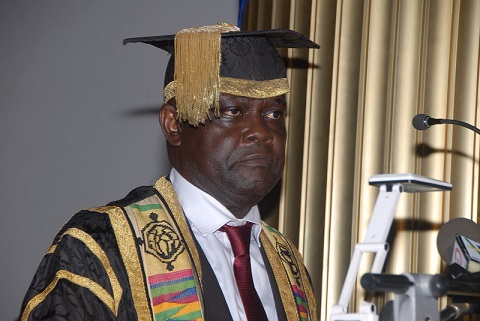
In August 2018, Charles Smith in West Norwood, London reported that an Arbitrator in London had made an arbitral award of over $160 million against University of Ghana in its dispute with project developers, in what has been described as the Africa Integras project.
Reacting to this, the University issued a public statement on 14th August 2018 to deny the report, citing “significant misstatements and untruths intended to cause panic among the University’s stakeholders and perhaps to put pressure on the University to accept a position detrimental to the interest of the University”. This was signed by the Registrar of the University, Mrs Mercy Haizel-Ashia.
The Vice-Chancellor, while visiting the US on August 11, 2018, and addressing the Congress of Legon Alumni, also denied that any such award had been made.
In explaining the circumstances surrounding the termination of the projects, he attributed the termination of the project to the inability of the University to raise a Letter of Credit from banks. He went as far as saying that problems had arisen with the project because he did not have enough knowledge about it, as he received no handing-over notes from his immediate predecessor.
He also said that, at the time the agreement was signed he was a Vice Dean, and so had no knowledge of its contents. He had earlier described publicly the Concession Agreement signed with Africa Integras as a “bad agreement” and suggested at a meeting with TEWU members at the Great Hall in 2017 that he was not sure of what inducements could have made his predecessor sign the agreement.
In an interview on Citi TV’s Face to Face Programme, the CEO of Africa Integras, Ms Andrea Pizicconi, virtually refuted all the claims that University of Ghana has made with respect to the Africa Integras project since the departure of Professor Ernest Aryeetey as Vice Chancellor. In the interview with Mr Akoto Boafo, Ms Piziconni traced the origins of the project and how her company was invited by University of Ghana to assist in developing a Public-Private Partnership (PPP) project.
She said the process of negotiations and due diligence went from November 2013 into the middle of 2015. Construction finally began in January 2016. The popular story has been that UG entered into the agreement without due diligence.
The BOT project was for a 25-year period, and the developers stood to make a return of 16% on their investment. Ms Piziconni also said that she had seen reference to how much her company stood to make, which was an exaggeration of the reality. The Minister of Education had mentioned in a radio programme that UG would pay $10 million a year as rent to Africa Integras.
She explained that, even though the amount was an exaggeration, the rent charged covered not only construction cost, but also the maintenance of the facility as well as the finance costs over the 25-year period. She insisted that most discussions of the project did not mention the amount that the University stood to make from the project, which would run into several billions of dollars. She believed the project was viable and affordable.
The affordability model was prepared together with UG officials, using data and projections provided by UG staff.
Ms Andrea Piziconni made it clear that her company dealt with the entire University management and not only with the former Vice Chancellor, as has been alleged several times by the current UG authorities. She said that even though the former Vice Chancellor was the “driving force” behind the project, her team spent a lot of time with the people below him, especially the Finance Director. Her team worked closely with UG’s lawyers, architects, engineers, surveyors, etc.
She indicated that the current VC, Professor Ebenezer Oduro Owusu attended several of the meetings that she held with the University management, and she did not recall him raising any objections to the project. She said the project was being financed by the US Government agency, OPIC and therefore the standards in preparing the agreement had to conform to OPIC requirements. The language of the agreement was the same as in all OPIC projects, including several in Ghana. This was in reaction to a statement attributed to the current VC that the agreement “enslaved the University of Ghana”. She said there was no way OPIC would have permitted that.
Ms Piziconni said that after the former Vice Chancellor left office, she made several attempts to engage with the new administration, but this proved very difficult. On many occasions, she travelled to Ghana from the US without meeting the VC. She used to come to Ghana monthly. Even when the VC was around, he would very seldom sit in meetings with her.
Mr Akoto Boafo asked her if any arbitration had taken place since termination, and she said “yes”, thus confirming the earlier stories about arbitration. She said an Independent Evaluator was appointed by both parties, and so UG played an active role in his selection. UG was also present when the arbitral award was announced. In effect, the UG authorities lied publicly about the arbitral award and many other things related to the project. The arbitral award is now a public document filed at the High Court in Accra.
Even though UG authorities claim that they are unable to discuss the project because of non-disclosure clauses built into the agreement, many experts believe that it is no longer a valid point as the agreement has been terminated and arbitration has been completed. Many stakeholders in the country have been wondering why the University has refused to present its side of the story. Some observers who watched the interview with Ms Andrea Piziconni have described her presentation as being very credible. One lecturer at UG said that he was waiting to see a statement from the Registrar saying that everything that Ms Piziconni said was untrue.
I have learned in the past few weeks, rather interestingly, that following the arbitral award, OPIC Insurance has paid WP Carey Inc, the main investors, a negotiated settlement of $46 million. WP Carey spent $28 million on construction. OPIC now expects the University of Ghana to pay them a negotiated amount of $56 million. Sources have indicated that the Government of Ghana has started paying this amount on behalf of UG. A lecturer at the University wondered what the justification could be for paying $56 million for uncompleted buildings when the total cost of construction would have been $64 million.
Could a clear case of financial loss be made with these recent decisions, and the current administration held accountable? Probably. Is it a simple case of hatred? Maybe not. However, there are many things about this project that might never be understood, and there is a real danger that the five buildings will never be finished, even though the University needs them badly. Ms Andrea Piziconni said she was heart-broken about the 1200 people who lost their jobs from the termination and the number of potential students who may never be able to go to university because of the current stalemate.
By Kwabena Kyenkyenhene Boateng



